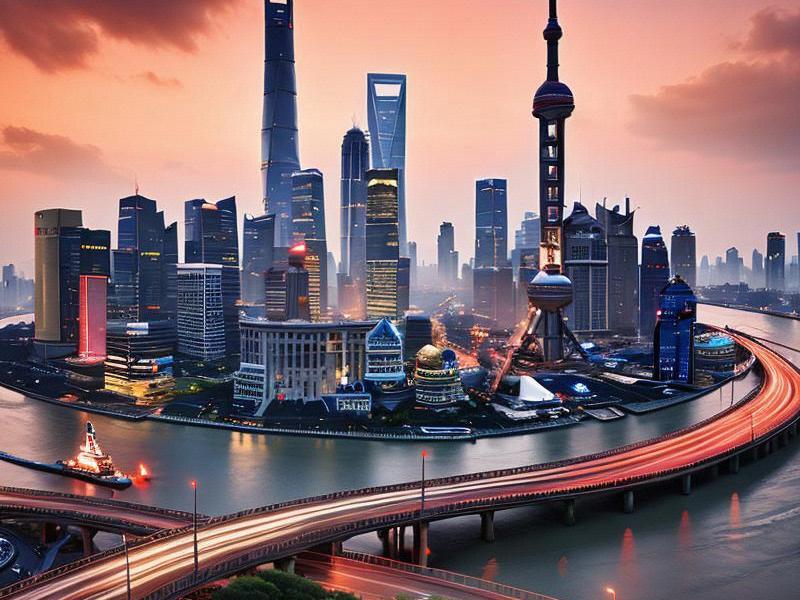
Shanghai, often referred to as the "Pearl of the Orient," stands as a beacon of China's economic prowess and cultural vibrancy. This dynamic metropolis, located on the eastern coast of China, is not only the largest city in the country but also a significant player on the global stage. With its stunning skyline, bustling streets, and rich history, Shanghai offers a fascinating glimpse into the future while honoring its past.
The story of Shanghai begins in the early 19th century when it was forced open to foreign trade following the First Opium War. The establishment of the International Settlement and the French Concession marked the beginning of Shanghai's transformation into a cosmopolitan city. These concessions brought together people from diverse cultural backgrounds, creating a unique blend of East and West that continues to define the city today.
Economically, Shanghai has been at the forefront of China's改革开放(reform and opening-up)(reform and opening-up)(改革开放)journey. Since the late 1970s, when China initiated its reform and opening-up policies, Shanghai has rapidly developed into a global financial center. The city's strategic location along the Yangtze River Delta has made it a hub for trade, manufacturing, and commerce. Its well-developed infrastructure, including the world's busiest container port and one of the busiest airports, underscores its importance in global logistics.
The Pudong area, once a rural landscape, has been transformed into a symbol of Shanghai's economic success. Home to the iconic Oriental Pearl Tower, the Jin Mao Tower, and the Shanghai Tower—the tallest building in China and the second-tallest in the world—Pudong is a testament to the city's ambition and innovation. The Lujiazui Financial District, with its modern skyscrapers and bustling financial institutions, attracts investors and businesses from around the globe.
阿拉爱上海 Shanghai's rapid economic growth has not only transformed its skyline but also improved the quality of life for its residents. The city boasts a high standard of living, with world-class healthcare, education, and cultural amenities. The Shanghai Museum, one of the largest and most prestigious museums in China, houses an impressive collection of Chinese art and artifacts. The city's vibrant theater scene, including the renowned Shanghai Grand Theatre, offers a wide range of cultural performances.
Culturally, Shanghai is a melting pot of traditions and modernity. The city's rich history is reflected in its historic neighborhoods, such as the French Concession and the Old City. These areas are filled with charming European-style architecture, narrow cobblestone streets, and quaint shops. At the same time, Shanghai is a hub for contemporary culture, with its trendy art galleries, music festivals, and fashion shows.
The Bund, a waterfront area along the Huangpu River, is a popular spot for both locals and tourists. Here, the contrast between the historic architecture of the Bund and the modern skyscrapers of Pudong is striking. The Bund offers breathtaking views of the city, especially at night when the buildings are illuminated. It is a place where the past and present coexist harmoniously.
Shanghai's culinary scene is another aspect that reflects its cultural diversity. The city is known for its delicious and innovative cuisine, which combines traditional Chinese flavors with international influences. From the famous xiaolongbao (soup dumplings) to modern fusion dishes, Shanghai's food scene is a delight for the senses. The city's night markets and bustling food streets offer a taste of the local culture and a chance to experience the city's vibrant nightlife.
爱上海419论坛 In recent years, Shanghai has also made significant strides in sustainability and environmental protection. The city has implemented various initiatives to reduce pollution, promote green energy, and improve public transportation. The Maglev train, which connects Pudong International Airport to the city center, is a prime example of Shanghai's commitment to sustainable transportation. The city's extensive network of metro lines provides efficient and eco-friendly travel options for its residents.
Shanghai's role as a global city is further enhanced by its international collaborations and events. The city has hosted numerous international summits, exhibitions, and cultural festivals, attracting visitors and investors from around the world. The Shanghai Cooperation Organization (SCO) and the China International Import Expo (CIIE) are just a few examples of the city's global influence.
Education is another area where Shanghai excels. The city is home to some of the best universities in China, including Fudan University and Tongji University. These institutions attract students and researchers from around the world, contributing to the city's intellectual and cultural vibrancy. Shanghai's emphasis on education and innovation has positioned it as a leader in research and development.
上海花千坊龙凤 Tourism is a significant contributor to Shanghai's economy, with millions of visitors flocking to the city each year. Attractions such as the Yu Garden, the Shanghai Zoo, and the Century Park offer a glimpse into the city's rich history and natural beauty. The city's shopping districts, including Nanjing Road and Huaihai Road, provide a wide range of shopping experiences, from luxury boutiques to local markets.
Despite its rapid development, Shanghai remains committed to preserving its cultural heritage and historical landmarks. Efforts have been made to restore and protect the city's historic buildings and neighborhoods, ensuring that future generations can appreciate its unique history. The city's blend of tradition and modernity makes it a unique destination that offers something for everyone.
In conclusion, Shanghai is a dynamic metropolis that exemplifies China's economic and cultural transformation. Its rapid development, rich history, and vibrant culture make it a city of endless possibilities. As Shanghai continues to grow and evolve, it remains a symbol of China's aspirations and a gateway to the future. Whether you are a business professional, a tourist, or a student, Shanghai offers a wealth of experiences that will leave a lasting impression.
